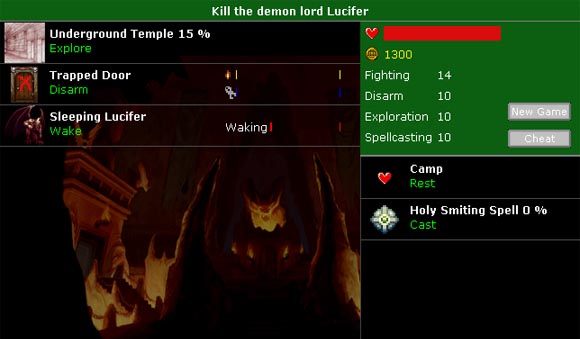Daniel Benmergui is probably most known for his inspiring, experimental Flash games like Today I Die, I Wish I Were The Moon or Storyteller. But he was also responsible for an older project I never managed to associate with him until just now. I was actually looking for it because I was running some ideas trough my head and was pleasantly surprised to recognize him as the author. The project I’m talking about is Hunter RPG. It’s an RPG without space.

Can there be a trapped door without space?
As the blog post says, the game is based on an quote by Chris Crawford. He observed that a common theme among games is that they all focus around spatial navigation. So Daniel tried to create a dungeon crawler without space. All actions in the games are executed by clicking and holding various menu entries in a large hierarchal structure.
I find the experiment exciting and fascinating. Especially since it works so well. However, I often come back to this idea and can’t help to wonder: has the space been truly eliminated in Hunter RPG? Sure, there is no visual projection of a world like we are used to from so many other games. There is no map or camera. But what remains is still essentially spatial. Instead of traversing a simulation of physical space, players explore a more abstract but nonetheless spatial hierarchy. After clicking long enough on “Explore Undergroud Temple” the option “Explore Oppressive Cave” appears. This suggests that the Oppressive Cave was found within the Underground Temple. Their spatial relationship is certainly less explicit but still present. Even going into quests takes players from the initial hub-menu into a nested quest-menu. And while there are quests without the exploration of caves in the demo, I find it somewhat ironic that the most exciting quest is the most spatial one.
What if the reason why games focus so much on spatial structure is more than just a stubborn obsession or a peculiar fad? What if spatiality is something inherent to human thinking? What if we can’t help but to structure information spatially in order to communicate and understand it? Some of the most powerful mnemonic techniques rely on creating a spatial representation for data. Most of computer interfaces also use spatial metaphors for navigating structures. Think of an Internet Browser: Back, forward, scroll down, zoom in. Come to think of it, I’m having a hard time to imagine a structure that WOULDN’T be spatial at all.
And even if it was, I’m sure users would just come in and bring spatial metaphors with them to make sense of it.
I don’t think space is our enemy. I think games are in many ways the poetics of space. But experiments like this show that the idea of space doesn’t have to be taken as literally as the overwhelming majority of games does. By questioning the dogma of space, we might not be able to overcome it, but we may arrive at a new and fresh was to deal with it.






Thanks for posting this!
I’ve been thinking along these line for a while now, but I had never run across this experiment.
I have been toying with the space in between RPGs (rouge-likes specifically) and Interactive Fiction. My main points of interest are more abstract/symbolic representions of the world so your imagination becomes involved. This happens in different ways in both IF and (ascii) rougelikes. And, stripping away all actions down to important decisions. IF trends this way because of its lack of spatial navigation, which accounts for a large part of the trivial decisions in most games. Dungeon Crawl Stone Soup really got me thinking though with auto-explore, where it litterally plays the game for you finding new areas until something interesting appears. What if all trivial decisions in a game had an optional high-speed auto-pilot and you just went from important decision to important decision?
I think, as you pointed out, in many ways spatial represenation is important given we are so spatially wired. Abstracting and/or automating the more trivial parts of dealing with space is an interesting avenue for games to explore more. HunterRPG is obviously relevant here. Thanks for pointing it out.
Good theme.
Dreams can be a good point to start. Surely the total supression of a space must be quite unaffordable, but any atempt with the holistic dimensionality could be interesting, maybe?
Crazy puzzling ways for the mind. New twisting thinkings, like Portal…
I found Hunter RPG to be an interesting concept, regardless of whether or not it lacks space. However, I’m not sure it can expanded much further than a concept. The challenge of the demo came from the limited time. Where could it go from there? Without turning the tasks into minigames ala texas cheat’em or something, what can be done?